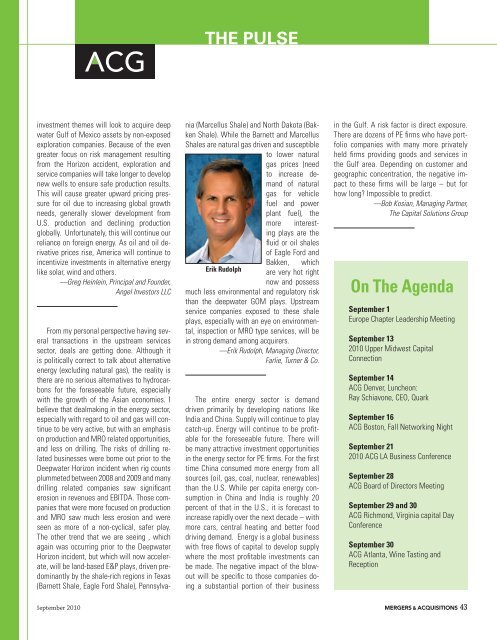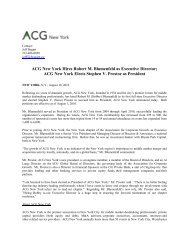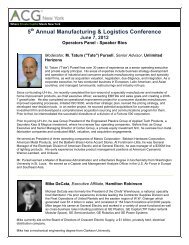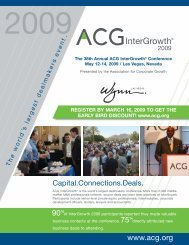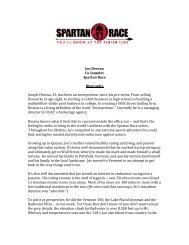September 2010 - Association for Corporate Growth
September 2010 - Association for Corporate Growth
September 2010 - Association for Corporate Growth
You also want an ePaper? Increase the reach of your titles
YUMPU automatically turns print PDFs into web optimized ePapers that Google loves.
THE PULSE<br />
investment themes will look to acquire deep<br />
water Gulf of Mexico assets by non-exposed<br />
exploration companies. Because of the even<br />
greater focus on risk management resulting<br />
from the Horizon accident, exploration and<br />
service companies will take longer to develop<br />
new wells to ensure safe production results.<br />
This will cause greater upward pricing pressure<br />
<strong>for</strong> oil due to increasing global growth<br />
needs, generally slower development from<br />
U.S. production and declining production<br />
globally. Un<strong>for</strong>tunately, this will continue our<br />
reliance on <strong>for</strong>eign energy. As oil and oil derivative<br />
prices rise, America will continue to<br />
incentivize investments in alternative energy<br />
like solar, wind and others.<br />
—Greg Heinlein, Principal and Founder,<br />
Angel Investors LLC<br />
From my personal perspective having several<br />
transactions in the upstream services<br />
sector, deals are getting done. Although it<br />
is politically correct to talk about alternative<br />
energy (excluding natural gas), the reality is<br />
there are no serious alternatives to hydrocarbons<br />
<strong>for</strong> the <strong>for</strong>eseeable future, especially<br />
with the growth of the Asian economies. I<br />
believe that dealmaking in the energy sector,<br />
especially with regard to oil and gas will continue<br />
to be very active, but with an emphasis<br />
on production and MRO related opportunities,<br />
and less on drilling. The risks of drilling related<br />
businesses were borne out prior to the<br />
Deepwater Horizon incident when rig counts<br />
plummeted between 2008 and 2009 and many<br />
drilling related companies saw significant<br />
erosion in revenues and EBITDA. Those companies<br />
that were more focused on production<br />
and MRO saw much less erosion and were<br />
seen as more of a non-cyclical, safer play.<br />
The other trend that we are seeing , which<br />
again was occurring prior to the Deepwater<br />
Horizon incident, but which will now accelerate,<br />
will be land-based E&P plays, driven predominantly<br />
by the shale-rich regions in Texas<br />
(Barnett Shale, Eagle Ford Shale), Pennsylvania<br />
(Marcellus Shale) and North Dakota (Bakken<br />
Shale). While the Barnett and Marcellus<br />
Shales are natural gas driven and susceptible<br />
to lower natural<br />
gas prices (need<br />
to increase demand<br />
of natural<br />
gas <strong>for</strong> vehicle<br />
fuel and power<br />
plant fuel), the<br />
more interesting<br />
plays are the<br />
fluid or oil shales<br />
of Eagle Ford and<br />
Bakken, which<br />
Erik Rudolph are very hot right<br />
now and possess<br />
much less environmental and regulatory risk<br />
than the deepwater GOM plays. Upstream<br />
service companies exposed to these shale<br />
plays, especially with an eye on environmental,<br />
inspection or MRO type services, will be<br />
in strong demand among acquirers.<br />
—Erik Rudolph, Managing Director,<br />
Farlie, Turner & Co.<br />
The entire energy sector is demand<br />
driven primarily by developing nations like<br />
India and China. Supply will continue to play<br />
catch-up. Energy will continue to be profitable<br />
<strong>for</strong> the <strong>for</strong>eseeable future. There will<br />
be many attractive investment opportunities<br />
in the energy sector <strong>for</strong> PE firms. For the first<br />
time China consumed more energy from all<br />
sources (oil, gas, coal, nuclear, renewables)<br />
than the U.S. While per capita energy consumption<br />
in China and India is roughly 20<br />
percent of that in the U.S., it is <strong>for</strong>ecast to<br />
increase rapidly over the next decade – with<br />
more cars, central heating and better food<br />
driving demand. Energy is a global business<br />
with free flows of capital to develop supply<br />
where the most profitable investments can<br />
be made. The negative impact of the blowout<br />
will be specific to those companies doing<br />
a substantial portion of their business<br />
in the Gulf. A risk factor is direct exposure.<br />
There are dozens of PE firms who have portfolio<br />
companies with many more privately<br />
held firms providing goods and services in<br />
the Gulf area. Depending on customer and<br />
geographic concentration, the negative impact<br />
to these firms will be large – but <strong>for</strong><br />
how long? Impossible to predict.<br />
—Bob Kosian, Managing Partner,<br />
The Capital Solutions Group<br />
On The Agenda<br />
<strong>September</strong> 1<br />
Europe Chapter Leadership Meeting<br />
<strong>September</strong> 13<br />
<strong>2010</strong> Upper Midwest Capital<br />
Connection<br />
<strong>September</strong> 14<br />
ACG Denver, Luncheon:<br />
Ray Schiavone, CEO, Quark<br />
<strong>September</strong> 16<br />
ACG Boston, Fall Networking Night<br />
<strong>September</strong> 21<br />
<strong>2010</strong> ACG LA Business Conference<br />
<strong>September</strong> 28<br />
ACG Board of Directors Meeting<br />
<strong>September</strong> 29 and 30<br />
ACG Richmond, Virginia capital Day<br />
Conference<br />
<strong>September</strong> 30<br />
ACG Atlanta, Wine Tasting and<br />
Reception<br />
<strong>September</strong> <strong>2010</strong> MERGERS & ACQUISITIONS 43


